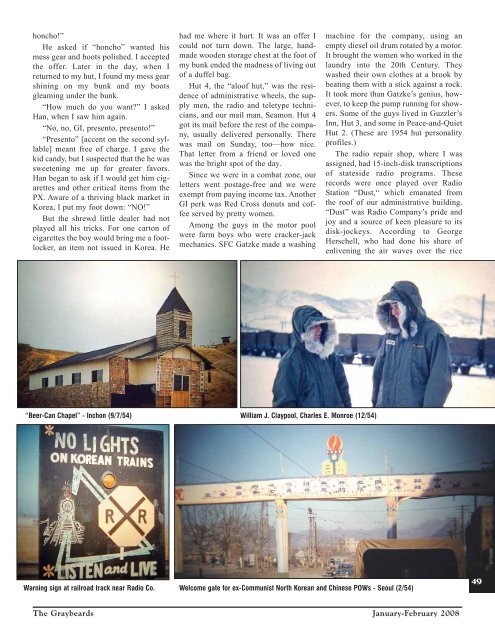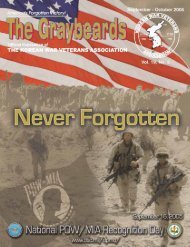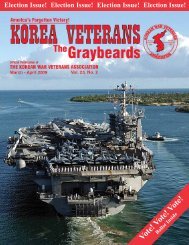Jan/Feb 2008 - KWVA - Korean War Veterans Association
Jan/Feb 2008 - KWVA - Korean War Veterans Association
Jan/Feb 2008 - KWVA - Korean War Veterans Association
You also want an ePaper? Increase the reach of your titles
YUMPU automatically turns print PDFs into web optimized ePapers that Google loves.
honcho!”<br />
He asked if “honcho” wanted his<br />
mess gear and boots polished. I accepted<br />
the offer. Later in the day, when I<br />
returned to my hut, I found my mess gear<br />
shining on my bunk and my boots<br />
gleaming under the bunk.<br />
“How much do you want?” I asked<br />
Han, when I saw him again.<br />
“No, no, GI, presento, presento!”<br />
“Presento” [accent on the second syllable]<br />
meant free of charge. I gave the<br />
kid candy, but I suspected that the he was<br />
sweetening me up for greater favors.<br />
Han began to ask if I would get him cigarettes<br />
and other critical items from the<br />
PX. Aware of a thriving black market in<br />
Korea, I put my foot down: “NO!”<br />
But the shrewd little dealer had not<br />
played all his tricks. For one carton of<br />
cigarettes the boy would bring me a footlocker,<br />
an item not issued in Korea. He<br />
had me where it hurt. It was an offer I<br />
could not turn down. The large, handmade<br />
wooden storage chest at the foot of<br />
my bunk ended the madness of living out<br />
of a duffel bag.<br />
Hut 4, the “aloof hut,” was the residence<br />
of administrative wheels, the supply<br />
men, the radio and teletype technicians,<br />
and our mail man, Seamon. Hut 4<br />
got its mail before the rest of the company,<br />
usually delivered personally. There<br />
was mail on Sunday, too—how nice.<br />
That letter from a friend or loved one<br />
was the bright spot of the day.<br />
Since we were in a combat zone, our<br />
letters went postage-free and we were<br />
exempt from paying income tax. Another<br />
GI perk was Red Cross donuts and coffee<br />
served by pretty women.<br />
Among the guys in the motor pool<br />
were farm boys who were cracker-jack<br />
mechanics. SFC Gatzke made a washing<br />
machine for the company, using an<br />
empty diesel oil drum rotated by a motor.<br />
It brought the women who worked in the<br />
laundry into the 20th Century. They<br />
washed their own clothes at a brook by<br />
beating them with a stick against a rock.<br />
It took more than Gatzke’s genius, however,<br />
to keep the pump running for showers.<br />
Some of the guys lived in Guzzler’s<br />
Inn, Hut 3, and some in Peace-and-Quiet<br />
Hut 2. (These are 1954 hut personality<br />
profiles.)<br />
The radio repair shop, where I was<br />
assigned, had 15-inch-disk transcriptions<br />
of stateside radio programs. These<br />
records were once played over Radio<br />
Station “Dust,“ which emanated from<br />
the roof of our administrative building.<br />
“Dust” was Radio Company’s pride and<br />
joy and a source of keen pleasure to its<br />
disk-jockeys. According to George<br />
Herschell, who had done his share of<br />
enlivening the air waves over the rice<br />
“Beer-Can Chapel” - Inchon (9/7/54)<br />
William J. Claypool, Charles E. Monroe (12/54)<br />
<strong>War</strong>ning sign at railroad track near Radio Co.<br />
Welcome gate for ex-Communist North <strong>Korean</strong> and Chinese POWs - Seoul (2/54)<br />
49<br />
The Graybeards <strong>Jan</strong>uary-<strong>Feb</strong>ruary <strong>2008</strong>
















